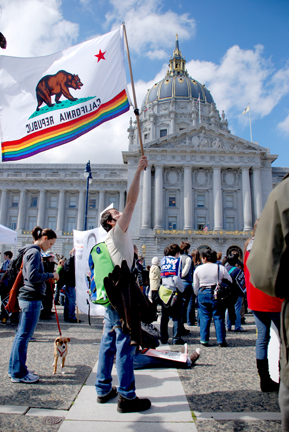WWII internment ruling will impact Prop. 8 judgment
By Greg Zeman
The Guardsman

Testimony in Perry v. Schwarzenegger, the 9th U.S. Circuit Court of Appeals case that will decide the fate of California’s Proposition 8 – which defines marriage as the union between a man and a woman – has ended.
Closing statements will be heard when proceedings begin again no earlier than March.
Plaintiffs challenging Proposition 8 argue the law singles out gays and lesbians, making it “suspect class legislation.” If they are successful, this group of the population would become entitled to special legal protection, and the burden of strict constitutional scrutiny would shift to the defense.
The concept of suspect classification comes from the 1944 Supreme Court case Korematsu v. United States concerning the internment of Japanese citizens during World War II. The court established that groups entitled to suspect class protections: Must be an obviously distinguishable minority, subject to a history of discrimination, that is so politically powerless it needs special assistance.
The majority opinion in that case, authored by Justice Hugo Black, stated that, “all legal restrictions which curtail the civil rights of a single group are immediately suspect. That is not to say that all such restrictions are unconstitutional. It is to say that courts must subject them to the most rigid scrutiny. Pressing public necessity may sometimes justify the existence of such restrictions; racial antagonism never can.”
Lower courts in California have granted suspect class status to gays and lesbians, but it remains to be seen if the 9th District will uphold that decision.
Pro-Proposition 8 witness Kenneth P. Miller, an associate professor of political science at Claremont McKenna College, testified that if political power meant the ability to get the attention of lawmakers, gays and lesbians could not be considered politically powerless.
While both Governor Arnold Schwarzenegger and Attorney General Edmund G. Brown are listed as defendants in their capacity as state officials, they have refused to participate in the trial because both of them support same-sex marriage.
Brown refused to defend Proposition 8 in the initial challenge to the law brought before the California Supreme Court in spring 2009. He urged the court to rule that Proposition 8 violates the natural rights clause of California’s constitution.
